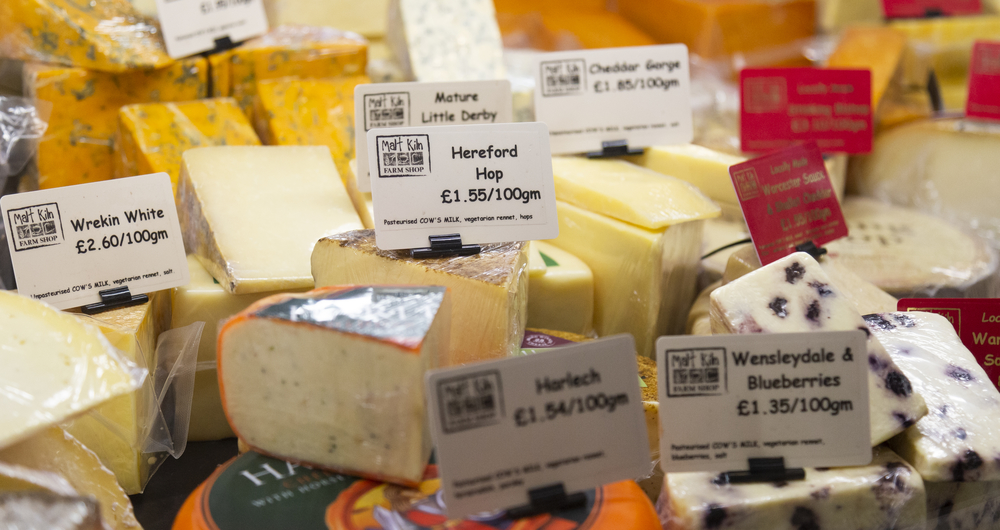GI protection guarantees a product’s characteristics or reputation, authenticity and origin. It also protects the product name from misuse or imitation.
It recognises the particular way, and/or region that a food is from, and the indelible link between place and food and drink that makes the UK’s culinary landscape so diverse.
There are UK GI logos that represent the three designations of GI product:
- protected designation of origin (PDO)
- protected geographical indication (PGI)
- traditional speciality guaranteed (TSG)

Why GI matters
Amy Egglestone, a fifth generation dairy farmer from near Melton Mowbray in Leicestershire, and her family have been providing Long Clawson Dairy with fresh milk in order to make Blue Stilton cheese, since it was founded in 1911.
Long Clawson Dairy is one of only six producers of Stilton cheese, in only three counties of the UK permitted to create Stilton solely by using whole milk with extra cream, with cows from Nottinghamshire, Derbyshire and Leicestershire.
The co-operative, owned by its farmer suppliers, is the largest producer of Stilton in the UK and sources its milk from 41 farms across the area and powers much of the local economy.
Amy takes great pride in the fact that milk from her 530 Holstein-Friesian dairy cows is collected each day and used to produce such a world-renowned cheese:
“We are in a unique position where we are producing a tangible product which is then made into a cheese with an amazing story and history.”
“It’s important that people know that by buying British GI food, you are supporting family businesses that are working together to create a wonderful product.”
Geographical Indication ensures that food is traceable and trustworthy, allowing the consumer to find out where the product has come from and learn more about the farms where it was produced.
You can hear more from Amy and her cows by following her on Instagram – @thedairydaughter
Promoting British produce
Member of Parliament for Rutland and Melton, Alicia Kearns, represents the UK’s rural capital of food: Melton Mowbray.
The town boasts huge array of exceptional food and drink producers, farmers and food manufacturers, from giants like Samworths and MARS to independent, artisanal producers like Round Corner Brewing and many more based in the Melton Mowbray Cattle Market.
After meeting with farmers and food producers, she created the All-Party Parliamentary Group on Geographically Protected Foods, which aims to promote and export great British produce, particularly the 65 products across the UK which have a GI status, and those wonderful delicacies hoping to hold or apply.

The need to improve
GIs protect and promote the best of British food and drink and provide huge support for local communities, helping to boost employment, bring higher wages and stabilise prices.
However, although the UK has one of the longest and richest food heritages in the world, we have only 65 GIs, which is a quarter of Italy’s, less than a third of the number in France, and half that of Portugal.
As Alicia Kearns MP said:
"Too often, we talk down our culinary culture, and belittle the extraordinary foods and drinks Great Britain calls its own."

As well as improving take-up of the scheme, the APPG has been working to make GIs a priority during trade negotiations, with GIs receiving dedicated time during negotiations and paying dividends, too.
The UK's new trade deal with Japan recognises more than 70 products from the UK as having a special status, whilst the previous deal under the EU with Japan recognised just seven.
But there’s more to be done. Because while many love a good pork pie topped with Long Clawson Stilton, or a scone with clotted cream, or Arbroath smokies and Somerset cider brandy, the vast majority probably don’t know that when they eat and drink these, they are actually enjoying products protected because of their origin and method of creation.
Have your say
As we leave the EU and craft a food and agricultural policy that works for the UK, we can do right by the people who feed and water us and make a GI scheme that’s world class.
The APPG on Geographically Protected Foods is undertaking a public consultation asking consumers, farmers and food producer what they think of the UK’s current GI scheme and what could be improved in terms of branding and marketing.
